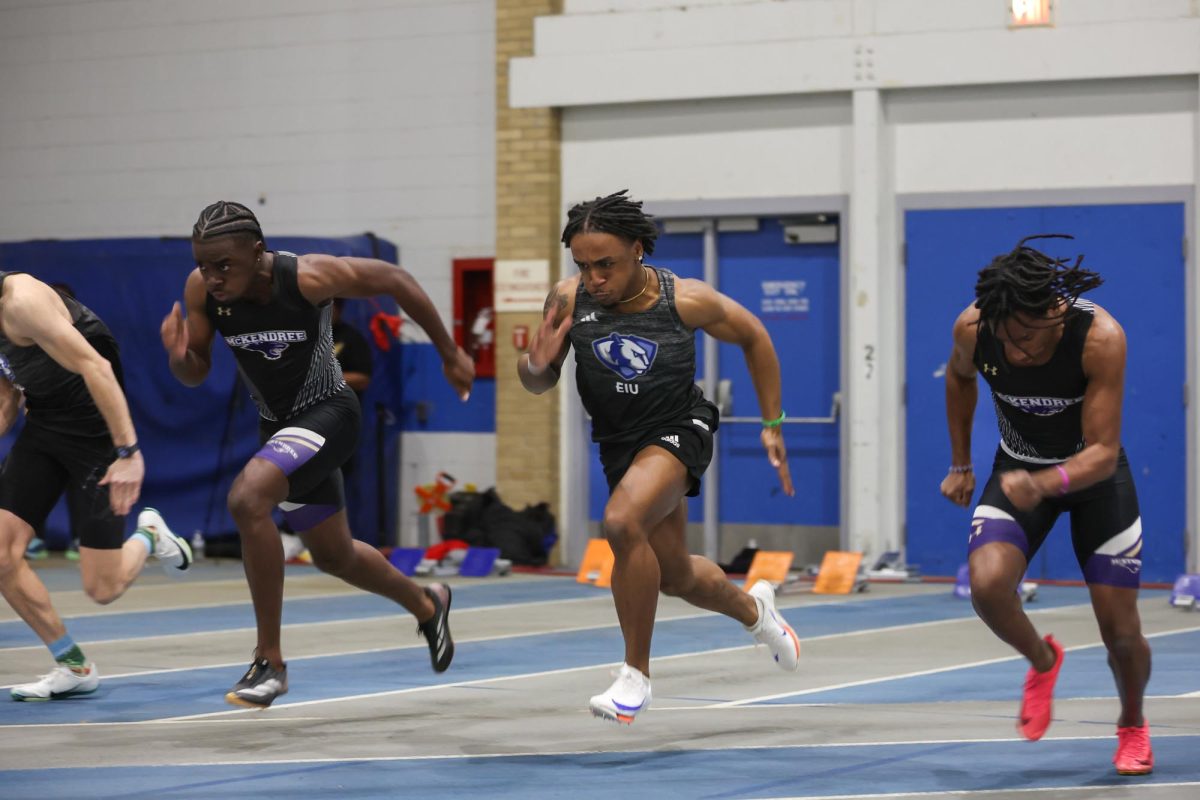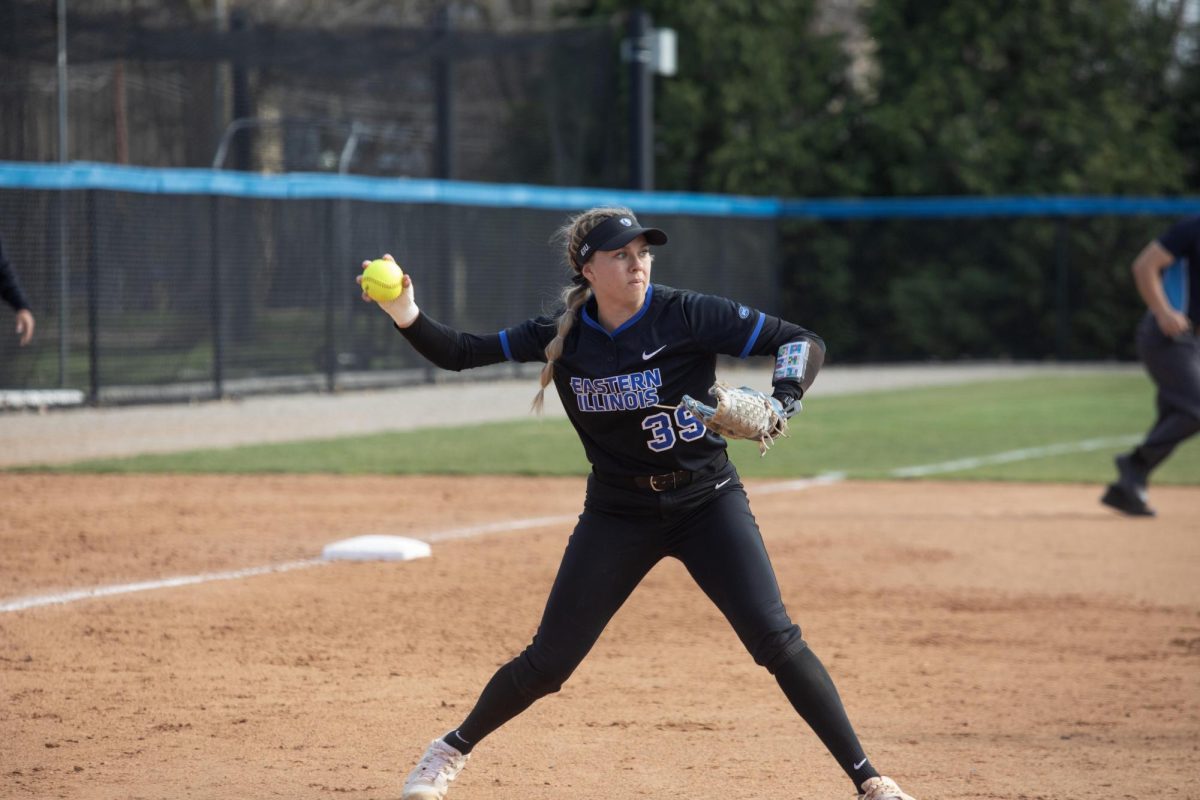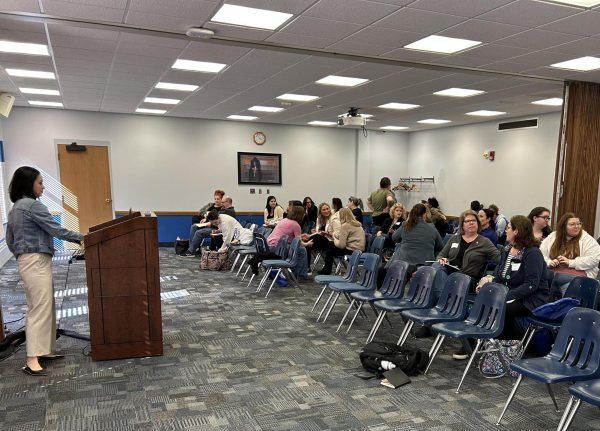Students begin to ‘Occupy EIU’
It began Monday at noon with graduate student Chris Wagner and friends setting up camp next to the Doudna Fine Arts Center. In hand, signs stated, “We are the 99%.”
By 11 p.m. Tuesday, temperatures dropped to 40 degrees and stinging rain poured down. Wagner and fellow students Sarah Audette and Eric Luminais wrapped themselves in blankets donated to them by other students.
With a sleeping bag, a small tent and their beliefs in tow, they prepared to camp out for the night. “Occupy EIU” had begun.
The first “Occupy” movement began on Sept. 17 on Wall Street when 2,000 people rallied in Lower Manhattan and marched up Broadway. From there, the participants stopped at Zuccotti Park, now known as “Liberty Square.”
The movement has T-shirts marketing its key slogan “We are the 99%”, gained global attention and even has its own Twitter hashtag.
But what does it mean to “Occupy”? Wagner said it is a way for those frustrated by the acts of the government to join together and show solidarity. Most of all, he added, it is about people becoming informed.
Graduate student Brendan Hughes said each “Occupy” city has a different central focus, depending on the needs and concerns of that particular community. For Eastern, one of those concerns can be the most recent push by the Illinois government to cut pension funding, he said.
During Tuesday, several students joined in – some to “occupy,” some merely taking a cigarette break and curious what this group was gathering for.
One of these students was Jeffrey Mantlo, a senior English major, who said he understands both sides of the “Occupy” argument.
However, “at the end of the day, corporations still need to make money,” he said. “That’s just the world we live in.” He added he was “definitely enlightened” by the conversation’s he had with the “Occupy” crowd on Tuesday.
The “Occupy” movement has had many critics. One of those is House Majority Leader Eric Cantor, who compared the Occupy Wall Street protesters to radical Tea Party activists. To those concerns, Hughes believes the “Occupy” movement needs time to grow and continue a public conversation.
“I don’t expect a united message to come out tomorrow, but I do expect it to come out in the future,” he said.
As of Oct. 15, the “Occupy” movement has gone global with 1,500 protests in 82 countries as part of a global day of action. “Occupy” movements have also been spreading to Illinois cities like Champaign, Bloomington-Normal and quite prominently Chicago, where more than 200 protestors were arrested this past weekend.
Wagner said this is unfortunate because the intent of the movement is to be peaceful.
“When violence breaks out, it distorts the message,” he said.
Audette, a junior music education major, believes college students are affected by this movement because they are the ones being buried under student debt in order to find a job in an economy that is not hiring.
Under the “Occupy” belief, 1 percent of worldwide society controls more than 35 percent of the global wealth. This leaves the rest of the “99%” – the teachers, students, workers and laborers.
Dani’ca Lehman, a freshman music education major, said she’s been affecting by the “1%” the movement calls against.
“A bigger corporation took my dad’s job two years ago and since then he has been unemployed,” she said. “I’ve been bouncing from job to job. This is not the way to live.”
Who are the “1%”? In a study conducted by Mother Jones on Oct. 10, the majority of the group is comprised of executives, managers, supervisors and lawyers.
One notion that has concerned the majority of “Occupy” groups is the notion of “Corporate personhood,” which is when corporations are afforded the same rights of a natural person under the Fourteenth Amendment.
Hughes said there are both positive and negative aspects to “corporate personhood,” such as corporations being protected against unreasonable searches.
However, Hughes added the “Occupy EIU” concerns will depend on those who become involved.
He said if the group does not gain support, they will “Occupy” until the end of the week. However, if momentum is gained, Hughes said, “We’ll stay as long as we have to. We’re not going anywhere.”
Shelley Holmgren can be reached at 581-2812 or meholmgren@eiu.edu.






![[Thumbnail Edition] Eastern Illinois softball senior infielder Briana Gonzalez resetting in the batter's box after a pitch at Williams Field during Eastern’s first game against Southeast Missouri State as Eastern split the games as Eastern lost the first game 3-0 and won the second 8-5 on March 28.](https://www.dailyeasternnews.com/wp-content/uploads/2025/04/SBSEMO_11_O-1-e1743993806746-1200x692.jpg)






![[Thumbnail Edition] Junior right-handed Pitcher Lukas Touma catches at the game against Bradley University Tuesday](https://www.dailyeasternnews.com/wp-content/uploads/2025/03/MBSN_14_O-e1743293284377-1200x670.jpg)

![[Thumbnail Edition] Senior Foward Macy McGlone, getsw the ball and gets the point during the first half of the game aginst Western Illinois University,, Eastern Illinois University Lost to Western Illinois University Thursday March 6 20205, 78-75 EIU lost making it the end of their season](https://www.dailyeasternnews.com/wp-content/uploads/2025/03/WBB_OVC_03_O-1-e1743361637111-1200x614.jpg)







































![The Weeklings lead guitarist John Merjave [Left] and guitarist Bob Burger [Right] perform "I Am the Walrus" at The Weeklings Beatles Bash concert in the Dvorak Concert Hall on Saturday.](https://www.dailyeasternnews.com/wp-content/uploads/2025/03/WL_01_O-1200x900.jpg)
![The team listens as its captain Patience Cox [Number 25] lectures to them about what's appropriate to talk about through practice during "The Wolves" on Thursday, March 6, in the Black Box Theatre in the Doudna Fine Arts Center in Charleston, Ill.](https://www.dailyeasternnews.com/wp-content/uploads/2025/03/WolvesPre-12-1200x800.jpg)

















